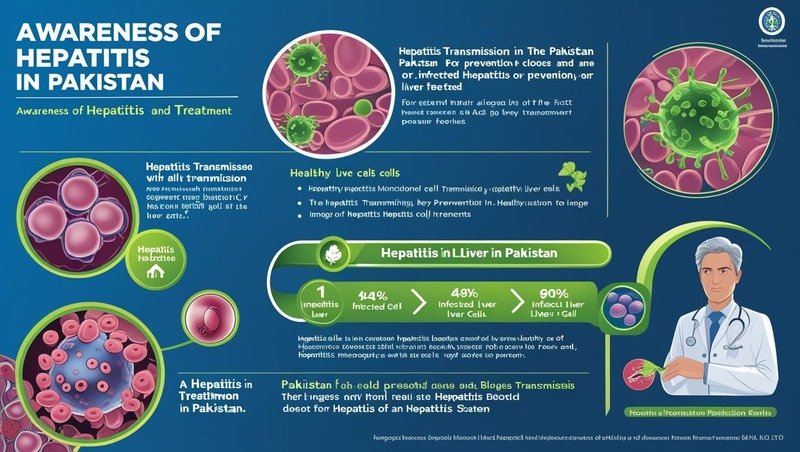
Awareness of Hepatitis in Pakistan: What Everyone Needs to Know
In Pakistan, hepatitis is a major health issue, yet many people are still unaware of its definition, how it spreads, or how to avoid contracting it. Millions of individuals nationwide still suffer from this silent illness, many without even realizing it, in spite of medical advancements and awareness initiatives.
The purpose of this essay is to provide information about hepatitis, including its forms, symptoms, causes, and—above all—how our country can combat it.
Hepatitis: What Is It?
Liver inflammation is referred to as hepatitis. Certain drugs, autoimmune disorders, infections, and excessive alcohol use can all contribute to this inflammation. Hepatitis A, B, C, D, and E are the most prevalent forms in Pakistan, with Hepatitis B and C being the most hazardous and pervasive.
The Pakistani Situation
At the moment, Pakistan has one of the highest rates of hepatitis infections worldwide, especially Hepatitis C. An estimated 12 million Pakistanis are afflicted with Hepatitis B or C, according to the World Health Organization (WHO). Thousands of new cases are recorded each year, with a large number occurring in rural and impoverished areas.
Lack of awareness, inadequate sanitation, risky medical practices, and restricted access to healthcare are the main causes of this growing problem.

Hepatitis Types and How They Proliferate
Let’s examine the prevalent varieties in Pakistan:
Hepatitis A
Cause: Water or food contamination
Symptoms include jaundice, dark urine, fever, exhaustion, nausea, and abdominal discomfort.
The good news is that it usually goes away on its own.
Prevention includes immunization, improved personal cleanliness, and clean drinking water.
Hepatitis B
Cause: Mother-to-child transmission, unsafe intercourse, unsterilized needles, and contact with contaminated blood
Symptoms might vary from mild liver damage to serious liver damage.
Liver cancer, liver failure, and chronic liver disease are complications.
Prevention includes getting vaccinated, not sharing needles, and having safe sexual relations.
Hepatitis C
The main cause is contaminated blood from improper injections and blood transfusions.
Symptoms: Usually not seen until liver damage happens
Complications include liver cancer, cirrhosis, and persistent infections.
Prevention: Current medications can treat the condition, but there is currently no vaccination.
Hepatitis D
Cause: Only occurs in those who have already contracted Hepatitis B.
More severe liver disease is one of the symptoms and complications.
Prevention: This is indirectly avoided by hepatitis B vaccine.
Hepatitis E
Cause: Polluted water, particularly when floods occur
Risk: Perilous for expectant mothers
Prevention: Cleaner water supply and better sanitation

The Significance of Awareness
The greatest risk of hepatitis is that it often takes years for symptoms to appear; by then, the liver has already been harmed. It is more difficult to identify and treat early due to its “silent” character.
Here’s why raising awareness is important:
Life is saved by early diagnosis.
Prevention is preferable to treatment.
Programs for vaccinations require public backing.
People with education are able to assist others in their communities.
How to Take the Test
Hepatitis testing is readily accessible and simple. If someone is infected, it can be determined with a straightforward blood test. Hepatitis B and C can be successfully cured or controlled if detected early. In Pakistan, access to Hepatitis C treatment has significantly improved in recent years.
Particularly, testing is advised for:
Individuals who received blood transfusions prior to 2000
Anyone with an IV injection history
Individuals that have hepatitis-positive family members
Healthcare professionals
Women who are expecting (regular prenatal screening is necessary)

Prevention Advice Everyone Should Take
You can take the following simple yet effective precautions to keep yourself and your loved ones safe:
Obtain a Vaccine
There are effective and accessible hepatitis A and B vaccinations.
Urge your friends and family to get immunized.
Sterile Needles Should Always Be Used
Don’t share a syringe. Make sure you use brand-new, sealed needles for every injection.
Steer clear of unlicensed clinics.
Some inexpensive clinics recycle their equipment. Only go to accredited medical facilities.
Exercise Caution When Receiving Blood Transfusions
Verify that the blood has undergone hepatitis and other infection screening.
Keep Yourself Clean
Wash your hands frequently, particularly after using the restroom and before eating.
Engage in Safe Sexual Behavior
To lower your chance of contracting hepatitis B through sexual contact, wear protection.
Don’t Share Personal Things
Infected blood particles can be found on objects like nail clippers, toothbrushes, and razors.
How to Increase Community Awareness
Making a difference doesn’t need you to be a doctor. This is how you can assist:
Discuss the dangers of hepatitis with your loved ones.
Post vetted health-related content on social media.
Urge community centers and mosques in the area to hold awareness events.
Participate as a volunteer for NGOs that focus on rural outreach and healthcare.
Encourage others, particularly the elderly or low-income families, to get checked or vaccinated.

What the Health Sector and Government Can Do
Government support is necessary for large-scale change, even while individual initiative is crucial. Authorities need to concentrate on the following:
Increase immunization campaigns, particularly in rural regions.
Keep an eye out for hygienic compliance at blood banks and clinics.
Educate medical personnel on infection control
Start nationwide public education initiatives in the media.
Treat hepatitis C patients for free or at a reduced cost.
Hepatitis may be eradicated in Pakistan with the help of public-private partnerships, but it begins with dedication at all levels.

Honest Conversation: Shifting the Attitude
The stigma associated with hepatitis is one of the main obstacles. Many people worry that if they test positive, they will be shunned or judged. Silence, denial, and worse results follow from this.
Let’s normalize discussing hepatitis in the same way that we discuss blood pressure or diabetes. It’s not a curse, but a medical issue. We can learn more and save more lives the more we communicate.
In conclusion, we can defeat hepatitis by working together.
Hepatitis is a social problem that impacts families, communities, and our country’s future in addition to being a health concern. But we can alter the narrative with awareness, instruction, and teamwork.
Do this now, if you haven’t already:
Find out more.
Get examined.
Keep others and yourself safe.
Get the word out.
Because we perform better when we are more informed.











Leave a Reply